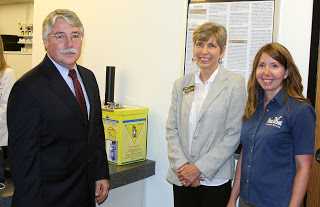Posted September 16th, 2015 in
Healthy Waters Last week, the Purdue University Retail Pharmacy became the latest participant in IISG’s multi-state effort to help communities properly dispose of their expired, unused, and unwanted pharmaceuticals.
This is the first pharmacy-based collection program that IISG has helped to start. Collaborators also include the Yellow Jug Old Drugs medicine take-back program, and Purdue College of Pharmacy.
Laura Kammin, IISG pollution prevention program specialist, worked closely with Patricia Darbishire, a Purdue clinical associate professor of pharmacy practice, to get the ball rolling.
“The reason I wanted to work with Patricia is that I know we will get really good feedback on how the program works from the pharmacy’s perspective,” Kammin said. “And because they will be conducting surveys, we’ll have solid data that can help improve collection programs in other communities in Illinois and Indiana.”
 The Yellow Jug Old Drugs program was started in 2008 by the Great Lakes Clean Water Organization working with pharmacies to collect and properly dispose of non-controlled substances to help reduce their impact on the Great Lakes.
The Yellow Jug Old Drugs program was started in 2008 by the Great Lakes Clean Water Organization working with pharmacies to collect and properly dispose of non-controlled substances to help reduce their impact on the Great Lakes.
In September of 2014, the Drug Enforcement Administration (DEA) changed the rules to allow pharmacies to take controlled substances. Individuals with unwanted medications can visit a participating pharmacy and dispose of both types of drugs in the yellow container that contains a substance that renders the pharmaceuticals non-retrievable.
To date, The Yellow Jug Old Drug Program has properly disposed of more than 52 tons of prescription waste—which means a reduction of pharmaceuticals getting into waterways.
Indiana Attorney General Greg Zoeller, who is the co-chair and founder of the state’s Prescription Drug Abuse Task Force, was also in attendance.
“Nearly 80 percent of heroin users say they started out abusing prescription drugs, and prescription drugs are causing half of the drug overdose deaths in our state,” Zoeller said. “Purdue’s participation in Yellow Jug Old Drugs will not only provide more disposal options to the community, it will instill in young people the risks of prescription drug abuse and hopefully save lives.”
Kammin was excited about the enthusiasm among the partners. “We all agree that we want to get drugs out of the community safely and to reduce the environmental impacts of improper disposal,” Kammin said.
For more information about how to start a medicine take-back program in your community, check out more resources available at www.unwantedmeds.org.
Purdue University Retail Pharmacy accepts both prescription and over-the-counter medications, including pills, ointments, liquids, and creams, Monday though Friday from 8:30 a.m. to 5:30 p.m.
The pharmacy is located at the Robert Heine Pharmacy Building, 575 Stadium Mall Drive, West Lafayette, Ind.

 The Yellow Jug Old Drugs program was started in 2008 by the Great Lakes Clean Water Organization working with pharmacies to collect and properly dispose of non-controlled substances to help reduce their impact on the Great Lakes.
The Yellow Jug Old Drugs program was started in 2008 by the Great Lakes Clean Water Organization working with pharmacies to collect and properly dispose of non-controlled substances to help reduce their impact on the Great Lakes.
